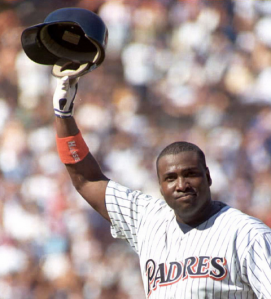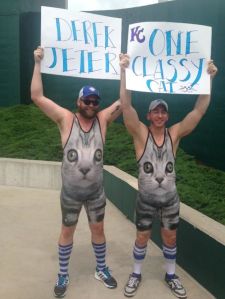No. No.
I like baseball. Do you like baseball? I like dingers. Do you like dingers? Of course. Who doesn’t like dingers? But I also like games with NO dingers, whenthose games also have no hits by one team. No-hitters are great, but they’re especially great when your team gets one (and embarassing when your team is the no-hittee). Around the 6th or 7th inning, not-so-subtle text messages are sent around. You know immediately what the hint is getting at, but you still check the live box score and say, “Whoa.” On Wednesday, Tim Lincecum threw a no-hitter. It was his second, you know. The best thing about a no-hitter is all the things. But here are the top fifty.
Source: “50 Awesome Things About Tim Lincecum’s (Second) No-Hitter”, Grant Brisbee, McCovey Chronicles (06/25/2014)
I Hope His Shoulder Was Al Dente…
If you tune into soccer every four years to watch the World Cup, you may not have been aware of Luis Suarez before this week. But now? Now you know him. Late in Uruguay’s match against Italy, needing a win to advance, Suarez bit an opponent. Suarez then tried to pretend like the player had struck Suarez in the face, and went down, attempting to draw a penalty kick. Uruguay would score shortly thereafter, advancing to the Round of 16, and sending Italy home in the process. This was below bush league. This was worse than classless. This is just Luis Suarez, a player with a history of biting opponents (seriously, this is the THIRD time he’s done this) and other transgressions, to go along with other worldly talent. -TOB
Source: “The Many Crimes of Luis Suarez”, Billy Haisley, Deadspin (06/24/2014)
“What is a Million Dollars Compared to the Love of Eight Million People?”
This is the rhetorical question once posed by Teofilo Stevens, a now deceased Cuban boxer, who none other than George Foreman declared the greatest heavyweight of their generation. Stevens turned down millions of dollars to fight Muhammad Ali, in order to live a life of poverty in Cuba – a life he believed in. In contrast, athletes like Yasiel Puig risk their lives for millions of dollars in the U.S. – and are treated like indentured servants for the rest of their lives. A short excerpt, that should convince you to read the entire 7,000+ words:
“Stevenson was in an impossible situation. He not only rejected America’s millions, but he also had to pretend there was no consequence. Stevenson had to be just as defiant in his choice as Puig was pretending he’d reached salvation entering American life with no lingering pain. Zero tolerance for dissent on this point cuts both ways. The emotional truth remains hidden.”
After you read that, watch the 15-minute documentary, “Ali vs. Stevenson, The Greatest Fight That Never Was” at the end. -TOB
Source: “Heroes For Sale: Teofilo Stevenson, Yasiel Puig, and the Agony of the Cuban Athlete”, Brin-Jonathan Butler, SB Nation (06/10/2014)
Pay Him. Pay Zat Man Heez Money.
LeBron James just announced that he would opt out of the final two years of his contract with the Heat and become a free agent. This is exciting news to me. I sure wish he comes to the Kings or the Warriors. In a free market, I think the Kings owners could afford to throw a ton of money at him, and convince LeBron to be a conquering hero. But, the NBA is not a free market. The league has implemented many restrictions to limit how much teams can spend on player salaries (e.g., max individual salaries, luxury tax). This has all somehow created a world where guys like Rudy Gay make nearly as much as LeBron James, which is nothing short of stupid. But if you lifted the cap on individual salaries and paid players based on production, how much would individual players be worth? As it turns out, LeBron is worth approximately $45 million. Per year. And Tim Hardaway Jr. should have PAID the Knicks over $12 million dollars for his performance last season. Ouch. That’s the kind of sports world I’d like to live in. -TOB
Source: “How Much is LeBron James Really Worth?”, Kyle Wagner, Deadspin (06/24/14)
Video of the Week:
Like what you’ve read? Let us know by following this blog (on the right side, up near the top), or: Email: 123sportslist@gmail.com
“I don’t know why they call this stuff hamburger helper. It does just fine by itself…”
– Cousin Eddie




